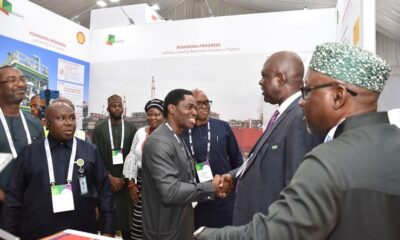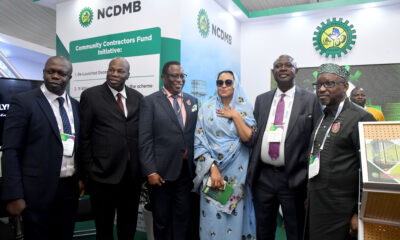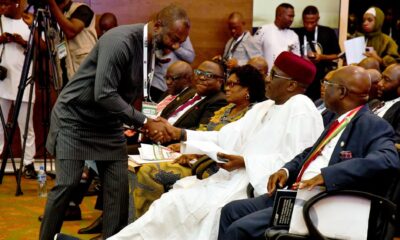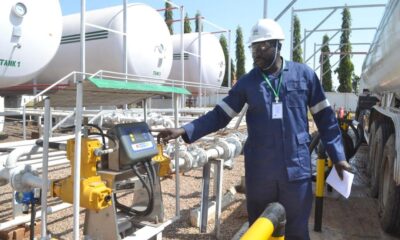Business
NCDMB, NLNG Commission Galvanizing Plant For Train 7 Project
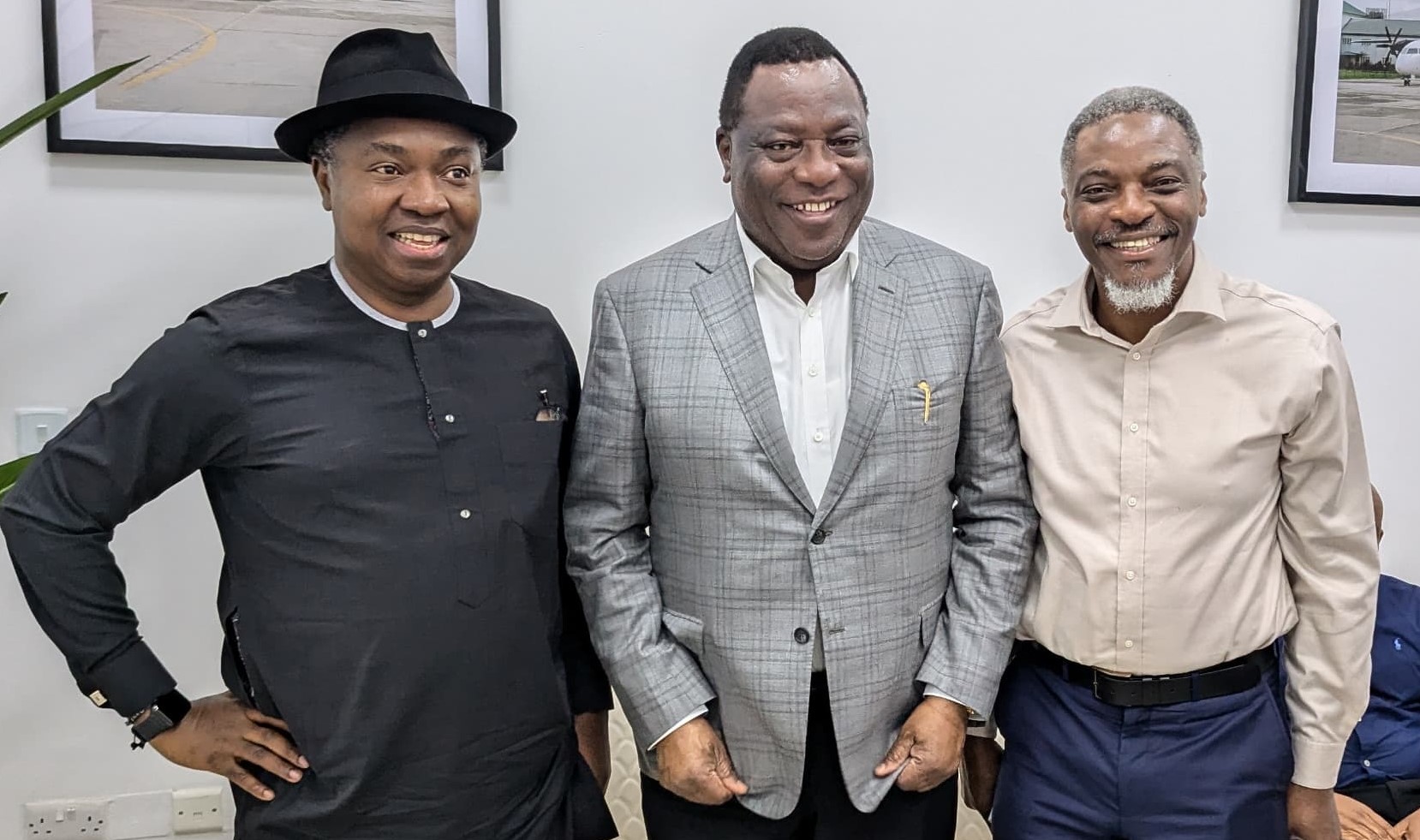
The Executive Secretary of the Nigerian Content Development and Monitoring Board (NCDMB), Engr. Felix Omatsola Ogbe has commissioned the 10,000 Tons per annum galvanizing plant constructed by Daewoo Engineering Nigeria Limited, one of the engineering, procurement, and construction (EPC) contractors of the Nigeria LNG Limited (NLNG) Train 7 Project.
The ceremony which held at Daewoo Galvanising Plant at Abam-ama, Okrika, Rivers State, on Friday, was attended by the Managing Director and Chief Executive Officer of NLNG, Dr. Philip Mshelbila.
ALSO READ: NCDMB Holds Retreat With Senate Committee On Local Content
The Galvanizing plant is one of the capacity development interventions for the Train 7 project and the establishment is sequel to NCDMB’s requirement that the execution of major EPC projects in the country must include the development of a legacy investment that will close a critical capacity gap in the oil and gas industry.
The Executive Secretary lauded NLNG and Daewoo Engineering for responding positively to the Nigerian Content legacy requirement, adding that the commissioning of the hot deep galvanizing plant has increased Nigeria’s galvanizing capacity to over 180,000 Tons/annum, with other facilities established by Dorman-long Engineering, Sparkwest steel industries and African Industries Group.
The facility will serve the Nigerian oil and gas industry and linkage sectors, including telecommunications, power and transport sectors that require galvanised materials.
The importance of galvanizing, he explained, included corrosion protection, extended service life of steel materials, cost effectiveness and safety assurances.
Ogbe indicated that the galvanizing plants and other strategic Nigerian Content investments could enjoy patronage from sister African countries courtesy of the Africa Continental Free Trade Agreement protocols, especially if the firms carry out intensive marketing and remain committed to quality standards and competitiveness.
He confirmed that the domiciliation of key industry capacities is contributing towards the attainment of the 70% Nigerian Content target by 2027 and “underscores the commitment of President Bola Tinubu’s Administration towards implementing pro-local production reforms that will bring about employment and economic prosperity.”
In his remarks, the Managing Director of NLNG, Dr. Philip Mshelbila reiterated the company’s unwavering commitment to achieving its Nigerian Content objectives in its Train 7 Project on Bonny Island.
According to Dr. Mshelbila, the protection of steel for durability was a significant application in the energy sector, bolstering the resilience of equipment against depletion and enhancing operational efficiency, reducing wastage from replacement costs, and prolonging the lifespan of relevant equipment.
“The visit to the Daewoo Galvanising Plant is a further ‘show and tell’ of our compliance with the Nigerian Oil and Gas Industry Content Development (NOGICD) Act and, our sincere vision of being a globally competitive LNG company helping build a better Nigeria.
“As we commission this facility, we are not only celebrating the expansion of our industrial capabilities but also reaffirming our unwavering commitment to contributing to the local economy and creating sustainable job opportunities for the local business environment,” he said.
Represented by NLNG’s General Manager, External Relations and Sustainable Development, Mr. Andy Odeh, the Managing Director reported significant progress in the Train 7 Project reflecting the Company’s commitment to excellence.
“We are proud to share the development of the Train 7 project, a groundbreaking initiative that sets new standards in the Nigerian oil and gas sector. Train 7 has achieved several notable milestones including the successful completion of key construction phases and the integration of advanced technologies that enhance our operational capabilities. These accomplishments reflect our commitment to delivering substantial economic and social benefits to Nigeria.
“Our dedication to Nigerian Content is evident in every facet of our operations. From enhancing local capabilities and fostering technological innovation to creating sustainable opportunities for Nigerians, NLNG remains at the forefront of these efforts. We at NLNG are determined to “Go Beyond Compliance” in line with our vision of helping to build a better Nigeria,” he stressed.
The industry executives alongside other executives of NLNG, NCDMB, Daewoo Construction and key stakeholders of the oil and gas industry took a tour of the plant.
Business
Savannah Energy Provides Unaudited FY 2024 Trading Updates

Savannah Energy has shared a trading update on its Nigerian operations and other markets in Africa, including up-to-date cash collections in its Nigerian business.
According to the update, made available on Thursday in Lagos, its gross production in Nigeria averaged 23.1 Kboepd for FY 2024, broadly in line with the prior year’s 23.6 Kboepd, of which 88% was gas (FY 2023: 91%).
On the update, CEO of Savannah Energy, Andrew Knott, said, “I am pleased to provide a FY trading update which demonstrates the continued progress we have made in 2024, a year which saw the highest level of cash collections ever recorded by our Nigerian business. 2025 is expected to be an exciting year for our Company: we have a large planned operational programme in Nigeria which is anticipated to enhance both our oil and gas production levels and capacity; we intend to progress our R3 East oil development project in Niger; we continue to pursue key acquisitions in the upstream oil and gas space; and we continue to seek to build our power business.
“Fundamentally, Savannah remains unequivocally an “AND” company, seeking to deliver strong performance both for the short AND long term across multiple fronts, and pursuing growth opportunities in both the hydrocarbon AND power sectors.”
The update It also shows that it generated a Total Income of US$393.6 million in 2024, compared to FY 2023’s US$289.8 million. This consists of Total Revenues of US$258.7 million and Other operating income of US$134.9 million.
The report also shows that Savannah’s FY 2024 Total Revenues were ahead of the previously issued financial guidance of greater than US$245 million, while FY 2024 financial guidance is reiterated for Operating expenses plus administrative expenses at ‘up to US$75 million’. The company expects its FY 2024 capital expenditure to come in lower than planned (previously guided at ‘up to US$50 million’) due to the phasing of spend.
ALSO READ: CSR: Dangote Awards Scholarships To 473 Students
According to the update, Savannah’s cash collections in 2024 amounted to US$248.5 million, a slight increase from the US$206 million it received in 2023. The report further shows that its cash balances as at 31 December 2024 stood at US$32.6 million, compared to the 31 December 2023 figure of US$107.0 million.
The report shows that the company’s midstream subsidiary, Accugas Limited, had as at 31 December 2024 drawn down on its NGN332 billion of the NGN Transitional Facility, with the resulting funds being converted to US$, which, along with cash held, was used to partially prepay the existing Accugas US$ Facility, leaving a balance as at 31 December 2024 of approximately US$212.3 million.
The report also provided new updates on Accugas’ US$45 million Uquo Central Processing Facility (“Uquo CPF”) compression project in Nigeria, noting that its commissioning which will enable the expansion of gas production in the medium term is well underway.
The report highlighted the progress being made in the procurement process of long lead equipment in Nigeria for a potential two-well drilling campaign on the Uquo Field in H2 2025, with an additional gas development well expected to add up to 80 MMscfpd of supplemental production capacity and a potential exploration well targeting an Unrisked Gross gas initially in place (“GIIP”) of 154 Bscf (25.7 MMboe) of incremental gas resources.
The update shows that progress is also being made in the planned Savannah acquisition of Sinopec International Petroleum Exploration and Production Company Nigeria Limited, whose principal asset is a 49% non-operated interest in the Stubb Creek oil and gas field (“Stubb Creek”), with regulatory approval and completion being targeted in Q1 2025. Following the completion of the acquisition, Savannah intends to commence an expansion programme which is anticipated to increase Stubb Creek gross production from an average of 2.7 Kbopd in 2024 to approximately 4.7 Kbopd.
In Niger, Savannah continues to seek to progress its 35 MMstb (Gross 2C Resources) R3 East oil development in South-East Niger, while it continues to push for a potential alternative transaction structure to acquire a material stake in producing oil and gas assets in South Sudan as previously announced on 20 December 2024.
On the renewable energy front, the update shows that Savannah has up to 696 MW of renewable energy projects currently in motion, including the up to 250 MW Parc Eolien de la Tarka wind farm project in Niger and the up to 95 MW Bini a Warak hybrid hydroelectric and solar project in Cameroon. A firm believer in Africa’s transition to renewable energy, Savannah continues to target a portfolio of up to 2 GW+ of power projects in motion by the end of 2026.
Business
Nigeria Can Achieve 5.5% GDP Growth – NESG
The Nigerian Economic Summit Group (NESG) has projected that the country has the potential to achieve a 5.5% growth in Gross Domestic Product (GDP) if critical policy reforms are sustained.
This was disclosed on Thursday during the launch of the NESG’s 2025 Macroeconomic Outlook report.
Speaking at the event, the Chief Economist and Director of Research & Development at NESG, Dr. Olusegun Omisakin, highlighted the need for more efficient policy implementation to unlock Nigeria’s economic potential.
READ MORE: Davido Is Richer Than His Billionaire Father – Ibrahim Chatta Claims
“We believe at the optimal level, if we embark on more efficient policy reforms, the Nigerian economy has the potential, the GDP to end up at 5.5 per cent, and we believe that this is achievable,” Omisakin stated.
More to follow……….
Business
CBN Approves Release Of Nigerian FX Code
The Central Bank of Nigeria (CBN) has announced the release of the Nigerian Foreign Exchange (FX) Code, a set of guidelines designed to promote ethical conduct among authorized dealers in the country’s FX market.
In a statement, the apex bank disclosed that the official launch of the Code would take place on Tuesday, January 28, 2025, at the CBN Head Office Auditorium in Abuja.
READ MORE: Dangote Denies Culpability In Pumping Up Petrol Price
“The Central Bank of Nigeria has approved the release of the Nigerian Foreign Exchange (FX) Code as a guideline to the banking industry to promote the ethical conduct of authorised dealers in the Nigerian Foreign Exchange Market,” the statement read.
The introduction of the FX Code is expected to enhance transparency, accountability, and professionalism within Nigeria’s foreign exchange ecosystem, aligning it with global best practices.
The event is anticipated to attract key stakeholders in the financial and banking sectors, as well as representatives from authorized FX-dealing institutions across the country.

